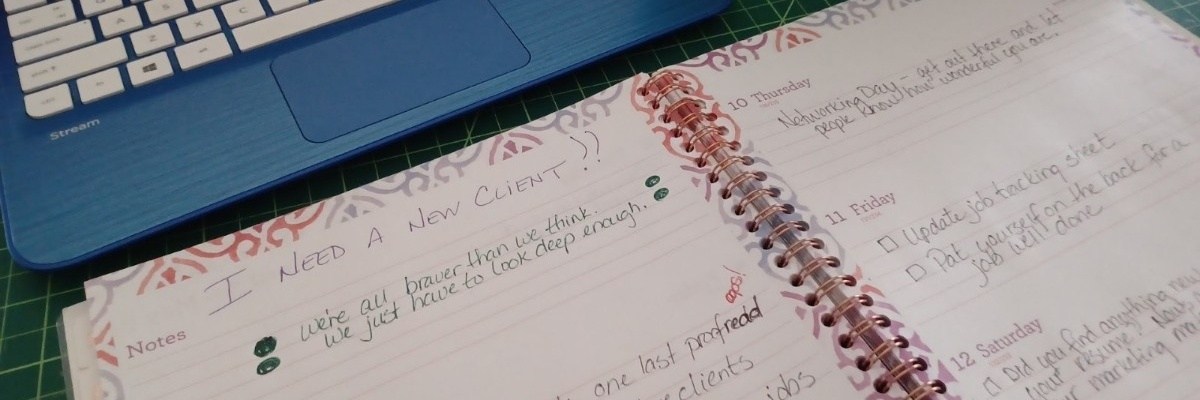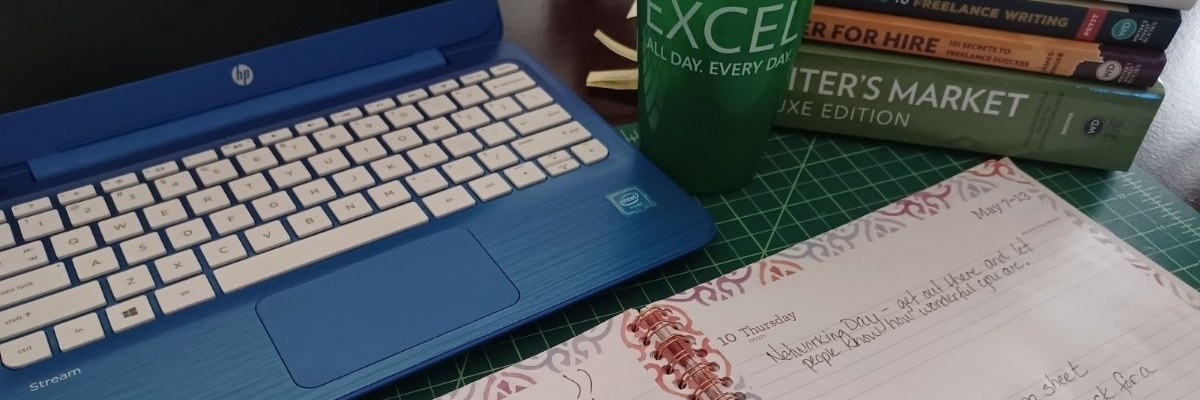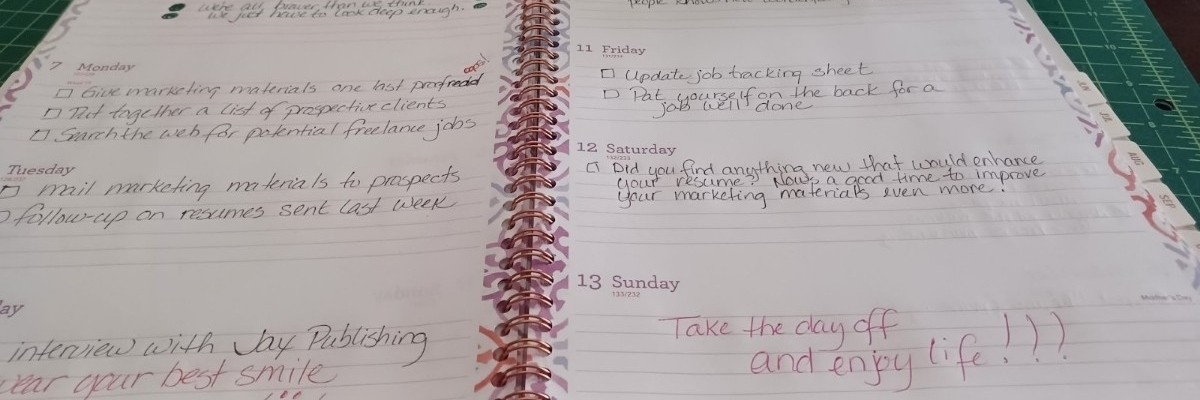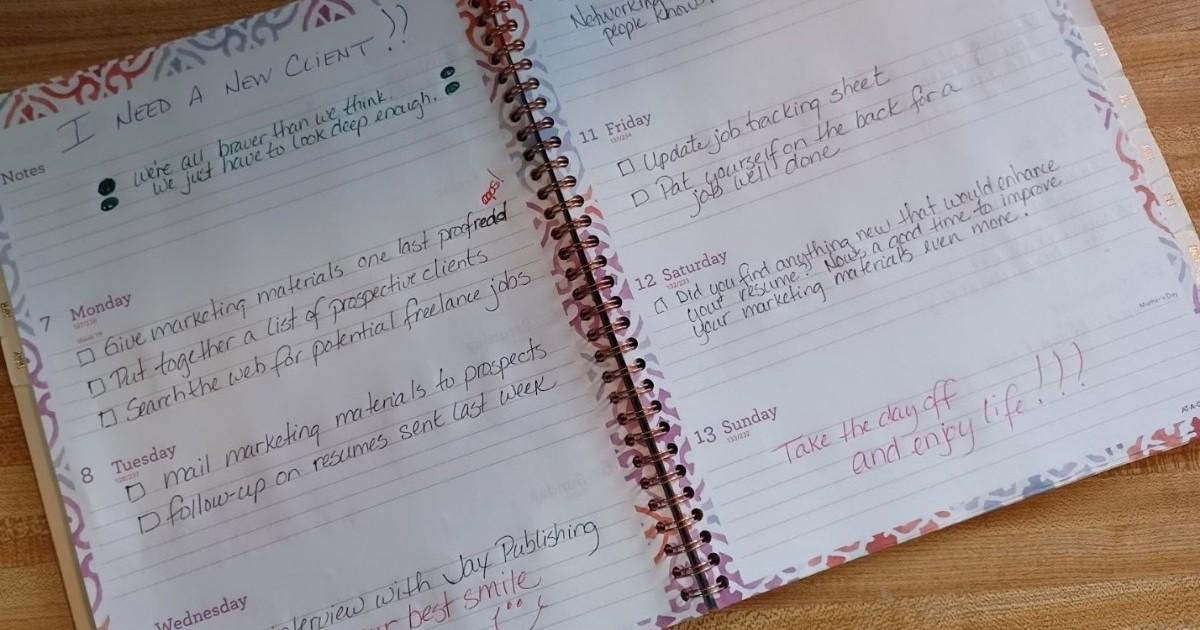A challenge of becoming a self-employed freelancer is that you’re always searching to find freelance writing jobs so that there’s a constant workflow.
I’m an introvert, and I don’t enjoy searching for my next writing gig. I dread selling myself, but it’s an essential part of my business.
My confidence improved and my freelance career blossomed when I finally embraced this task and began working with a step-by-step plan.
Searching for the perfect jobs and the perfect clients may be a royal pain. Still, with planning and preparation, you will get hired as a freelance writer and be on your way to achieving success and landing high-paying writing projects.

TL;DR
- Becoming a successful freelancer requires a plan and preparation.
- All freelance job searches go through three stages: preparation, interview, and negotiation.
- Following a sequential job search process can help you manage overwhelming tasks and give you time to complete each step.
- There are eight steps to a successful gig search, starting with self-preparation and marketing materials.
- Confidence, communication skills, poise, and resources are crucial fundamentals for launching your search.
The stages of a successful freelance job search
The what, when, why, and how you look for a freelance gig will differ based on your search techniques, personality, and the writing market. Still, all job searches go through three stages:
1. Freelancers want something in their next gig. In this stage, you’ll prepare for the search, decide what type of writing projects you want, and create a profile of your ideal client.
2. Freelancers interview for the jobs they want. You’ll need marketing materials that catch attention and highlight your skills. You’ll also need to practice your interviewing skills.
3. Freelancers and clients decide to work together. You’ve made it, and now it’s time to negotiate a price that pays you what you’re worth and is fair to the client. Then, it’s up to you to write the highest quality content you can and deliver your work on time.
Every successful search has these three stages. So, when you move through this process and follow your plan, you’ll have success finding plenty of gigs to keep you busy and your bank account full.

The benefits of following a plan to find freelance writing jobs
It can be overwhelming when you first look for freelance jobs. I know I was. There’s so much to do and not enough time to do it. Resumes, interviews, social media. Oh, my!
Where do you begin? And what tasks can you do first so that the other steps flow smoothly?
A sequential job search process means you won’t worry about what comes next. Focus on where you are in your search, and give yourself time to complete that step.
Before you think about résumés (and other networking items), explore your possibilities and desires. Before you get anxious about interviewing, prepare for the search, position yourself effectively, and learn about the people and companies you’ll meet. Give yourself time for the job search to progress.
Even though it’s important to follow a plan, it’s also important to be flexible. You’ll learn things along the way. You’ll learn about jobs, companies, and industries that aren’t advertised.
Use this feedback to identify your ideal writing project, strengths, weaknesses, and skills. Then adapt your search process to these new pieces of information.

How to find freelance writing jobs
Tackling your marketing efforts in smaller steps makes it easier to accomplish the tasks needed to find freelance writing jobs that match your skills, needs, and interests. If you’re just beginning your freelance writing journey, follow these steps in order. Each step influences the following steps.
As you work through the steps, revisit the previous steps. Use the feedback from each step to strengthen and refine the others. For example, while reading job postings or interviewing with prospects, you might learn that a particular skill or experience is important.
When you find some tidbit like this, go back to your marketing materials and highlight these items in your résumé or structure future cover letters differently to emphasize this new information.
What are the eight steps to a successful gig search? It starts by preparing yourself and your marketing materials. This will help you decide which clients to target. Then, you’ll apply for the jobs you want and give your best pitch while interviewing.
After you’ve been chosen for the project, ask for a rate you deserve and then deliver your best work.
LinkedIn is a great place to research companies, network with prospective clients, and find freelance writing projects. Megan Grant has the best tips.
Step 1: Prepare yourself for the gig hunt
When you follow the eight steps to a successful gig search, you’ll learn how to get from where you are now in your freelance journey to your next gig, and the next gig, and a long line of future gigs.
You’re a writer, so knowing how to do the job is the easy part. You have the writing and creative skills to impress the client. But convincing them to hire you is different from being qualified to do the job. Success is all about being prepared.
Prepare for the search before you pound the pavement (or log on to the internet) to find the perfect gig. Here are the fundamentals you’ll need to launch your search:
- Confidence. 100% belief you will get a gig and a positive attitude.
- Communication skills. Written, verbal, presentation, and listening.
- Poise. Your clothing, body language, and manners.
- Resources. Time, an office, computer equipment, high-speed internet, clothing budget, and transportation.
With this foundation in place, it’s time to make a list and create a profile of your ideal client.
Step 2: Identify your ideal client
This step is where you’ll identify the types of jobs you’d like to do and define what you want. You need to know what you want before you can act on your job search. While you can’t consider every job available, you’ll need a structure to filter your possibilities and narrow your job search targets.
After you have a clear idea of your ideal writing projects and clients, consider how these elements play into how you’ll find freelance writing jobs:
- Location. Where do you want to work? Do you want to offer your services to local businesses? Do you like to travel? Or would you rather work from your home office?
- Industry. Do you have the skills or experience needed in a certain industry? What interests you?
- Function. Is there a problem you can fix? Do your skills fill a need?
Only you can decide which of these items are important to you, how much you prioritize these elements, and if you’re willing to make trade-offs.
Don’t limit yourself to one ideal job or one ideal client. There are advantages to having multiple targets. You’ll increase your job opportunities, be ready for slow times, and enjoy a variety of writing projects.
What do clients look for in a freelance writer? Writing Revolt shares the skills and qualities she looks for. (Warning: You’ll hear a few cuss words.)
Step 3: Create a compelling marketing campaign
Your marketing materials should be compelling, innovative, and of the highest quality. They should give your ideal client a crystal clear impression of the quality associated with your name, your abilities, and your reputation before they meet you.
Your marketing campaign sets the stage for these quality interactions, especially when you’re networking, interviewing, and signing the contract.
Create a compelling marketing campaign that you can use to build a strong, effective, and successful job search. Consider building a website for your freelance writing portfolio and make sure to follow the best website design practices.
To find freelance writing jobs, start with the basic campaign tools:
Resume. A resume is a must-have, even if you plan to use a brochure. You can create the brochure using information in the resume. Plus, you’ll need this when prospects ask about your background.
Cover letter. A cover letter is the perfect companion to your brochure and resume. It must make a strong case for why a prospect should invest their time in meeting you and why they should hire you.
Online profiles. Your online profiles must be professional and attention-getting, and use the appropriate keywords so that your name appears in search results.
Networking pitch. Your pitch highlights your strengths and the value you provide. It must have a professional tone and be suitable to your goals. It must also be practiced so that you can deliver it at a moment’s notice.
Your marketing campaign introduces you to prospective clients and positions you for success. When your marketing materials are informative and high quality, you’ll have better interactions with prospective clients.
Just like creating a strong and successful brand, a marketing campaign presents you in the best possible way. Your campaign should get a prospect’s attention long enough to propel your search forward.
Before you share your marketing materials with your prospects, make sure your materials are well-written, error-free, and show your strong command of the English language.
After proofreading your materials, find people who will double-check and triple-check your materials. Ask a trusted friend, a mentor, or a professional career coach.
Do you have a website for your writing portfolio? Location Rebel talks about why it’s important to have a freelance writing portfolio website and what you should include in it.
Step 4: Research your target market
Next, you need to know what your ideal clients are looking for. You’ll conduct in-depth research on your ideal jobs, companies, and industries. You’ll learn about prospective clients so that you’re prepared when you meet.
This research is about diving deep and gaining specific knowledge and expertise about your short list of targets.
You’ll research trends, challenges, culture, and things that are important to you. Some of this research will entail speaking to people in the areas you are targeting, so have your resume ready.
As you do your research, tailor your marketing materials to match what your target jobs, organizations, and industries are looking for in a freelance writer.
Here are some of the places you’ll find more information:
- Job-specific research resources. Search job boards, professional associations, biographies, news sites, and social media.
- Financial statements. Check the websites for the investor relations of a company, the SEC Edgar database, and Dun & Bradstreet.
- Current news. Set a Google Alert for keywords and organization names.
- Informational interviews. Share what you’ve learned with a peer, mentor, or thought leader, and learn about their background and ideas.
Step 5: Start networking and prepare for the interview
Networking and interviewing go hand in hand. While you’re networking, you’ll come across interview opportunities. And while you’re interviewing, you’ll meet people who can further your career (make sure to return the favor).
Before you start networking, make sure your networking pitch is written, edited, and practiced until it’s delivered confidently and proactively.
And while you’re networking, strive to establish long-term, mutually beneficial relationships of give and take. As you get to know your contacts and build mutual respect and trust, they’ll open their networks to you.
You know your resume inside and out, so you are prepared for that part of the interview. But how well do you know the company, the job, and the industry? Learn everything you can so that you can ask intelligent questions.
Practice answering common interview questions and questions clients commonly ask freelance writers. That way, you won’t hem and haw during the interview. And, show up on time, maintain positive body language, be authentic, be true to yourself, and follow up with a polite thank you note.
Your tone of voice is a powerful tool. Make a good impression by creating a professional tone that engages and shows off your personality. Vinh Giang is hilarious.
Step 6: Stay motivated, keep organized, and troubleshoot your search
You can use many techniques to stay motivated and positive while looking for your next freelance writing project. It’s crucial that you keep on track, fix problems as they come up, and stay organized while juggling meetings and absorbing the information you collect.
Creating a routine and a set of actions can fire your motivation. Taking breaks will clear your mind and keep you from feeling overwhelmed.
Developing a system to track your contacts and keeping notes about each will help you refine your search and be productive. Plus, clients will think you’re pretty smart because you remember the smallest details.
Step 7: Negotiate for the rate you deserve and close the offer
You made it! Your research matched you with the perfect client and the perfect job. The interview was a snap, and the client noticed your shiny star among the pool of freelancers. And you got the job. Now it’s time to negotiate for the money you want.
But where do you begin? Your research should have given you insights into industry pay rates and the client’s financial position. Here’s your starting point.
Many freelance writers shy away from negotiations. They’re either scared to ask too much, worried that the client will offer too little, or just plain scared of creating a conflict.
One way to get around this is to leave your emotions at the door before discussing money. Pull up your confidence and ask for the money you feel you deserve. But be willing to consider a client’s lower offer without getting mad or feeling insulted. (Remember, every client has a budget, and they must stick to that budget to pay their bills.)
Weigh the client’s offer against any nonmonetary benefits the client offers, such as learning a new skill or simply an awesome group of people to work with. It isn’t always about the money.
Step 8: Work your way to success while you find freelance writing jobs
Congratulations. You’ve been able to find freelance writing jobs that you enjoy and that give you a sense of accomplishment. But your marketing job doesn’t stop there.
Start strong when you show up for your first day on the job. You’ll impress your client by hitting the ground running. Get yourself up to speed by making the most of any training the client provides and get clear instructions about what you need to get done and your deadlines. And develop good relationships with everyone you encounter.
Then, when your contract is complete, collect contact information and say thank you. Relationships with your clients are essential.
Doing well at the job is one part of managing your career. Also look at your future goals, your client’s future needs, and the job market. Then, develop the training, experience, and relationships necessary to reach these goals.
And never stop selling yourself and your freelance writing services.

Launch a successful gig search and find freelance writing jobs that you enjoy
There are two important items to keep in mind as you progress through your job search and meet people who are beneficial to your career.
The first is that today’s workplace is diverse. And, as a freelancer, you must be flexible, adaptable, and kind to survive and succeed. Remote teams include members who live in different time zones, with people working all hours of the day (and night). There will be times when you’ll need to adjust your schedule for a project.
Plus, we have a multi-generation workforce, with people from 18 to 80, and each generation has different experiences and expectations. Instead of focusing on these differences, build a rapport with each person you meet. You’ll be surprised at what a 20-year-old and a 60-year-old can learn from each other.
The second is that you want this process to be manageable. Throughout your freelance career, you’ll always be looking for that next gig. It’s inevitable. The best way to make your gig hunt manageable is to follow a framework.
But the framework in this guide isn’t fixed. So expect to revisit the steps to refine and adjust your search. For example, while researching your target market, you may think of a better way to word your cover letter and resume to attract a prospect’s attention.
When you follow this eight-step process, you’ll accomplish everything you need to do to find freelance writing jobs and work on the projects you want. Having a process keeps you moving forward to your end goal. It’s all about that success!
FIND RELATED ARTICLES
